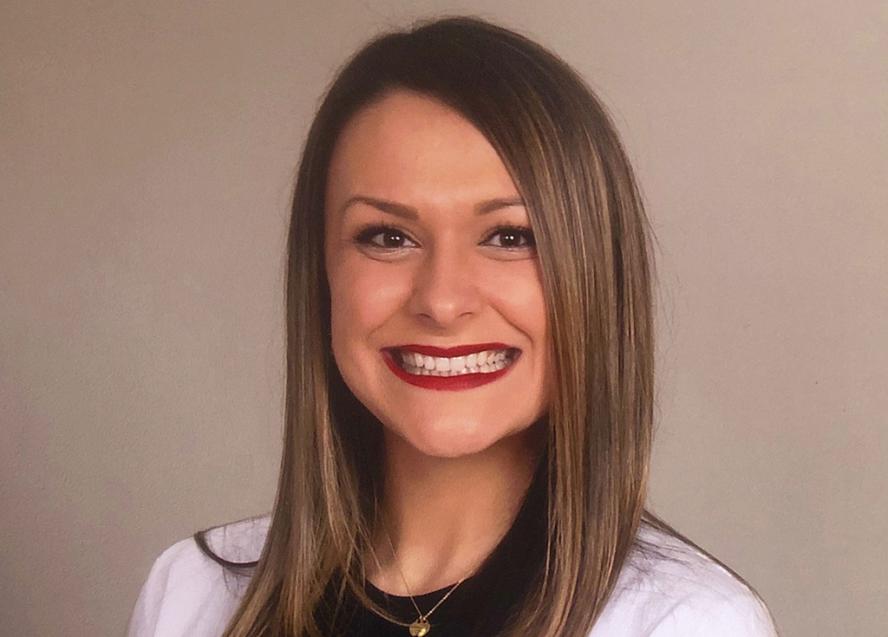-
About
- Leadership & Faculty
- News & Events
-
Academics
- Graduate
- Advanced Clinical Training
- Continuing Education
- Academic Departments
- Academic Offices
- Simulation Experiences
-
Student Life
- Offices
-
Research
-
Hospitals & Clinics
- Emergency Care
- Hospital Services
-
Community Outreach
- Volunteer
How the MS-IDGH Program Launched a Physician Assistant’s Career
Paulina Paw, VG17, puts her infectious disease knowledge to good use at hospitals and medical practices in Pennsylvania

Paulina Paw, VG17, had a specific goal in mind when she entered the Master of Science in Infectious Disease and Global Health (MS-IDGH) program at Cummings School of Veterinary Medicine. She hoped the rigorous 12-month program would give her a leg up when applying to physician assistant (PA) programs.
It turned out she was right.
“I was offered interviews to seven PA programs upon graduating from the MS-IDGH program and accepted an offer to attend the 24-month PA program at Lock Haven University in Pennsylvania,” said Paw. “The MS-IDGH offered everything I was looking for, including a fast-paced, challenging curriculum that not only allowed me to prove my academic potential but delve deeper into understanding the diseases that afflicted the patients I worked with.”
That included patients at the University of Rochester Medical Center, where she worked for two years after earning a bachelor’s degree in biology from the State University of New York at Geneseo. As an ambulatory technologist, she saw firsthand what it was like to work with infectious disease and immunizations in an acute outpatient clinic setting. This experience grew her desire to pursue a career as a PA.
She described herself as a “shy but hardworking student” when she arrived at Tufts in 2016, where she was struck by the small class sizes. Paw said the student-teacher ratio allowed faculty members such as Abhineet Sheoran, director of the MS-IDGH program, to “really hone in on an individual’s strengths and weaknesses. He encouraged us to be leaders, speak up in class, ask for clarification, or offer feedback from our individual experiences. That was really beneficial.”
Sheoran invited Paw to speak in front of the Board of Advisors at Cummings School with a panel of students representing the various master’s programs. She said the experience stood out to her because she had the opportunity to interact with stakeholders in the school that she otherwise wouldn’t have met.
Paw took a gap year between Tufts and her PA program, during which she moved to Pennsylvania to be closer to both Lock Haven University and her fiancé, whom she met as an undergraduate student and lived away from while at Cummings School. Professionally, however, there was no time to rest. She took a job as a clinical research coordinator for the University of Pittsburgh Division of Infectious Diseases.
“They did a lot of HIV and AIDS prevention and treatment studies, so I was involved in direct patient care,” she said. “It's definitely one thing to learn about an infectious disease in school. But when you're seeing a patient that actually has that disease, it really brings everything into perspective. I love the ability to use my knowledge to help individuals feel better and tackle the problems they're dealing with.”
When she started her PA program in 2018, the lessons from Cummings School on leadership and public speaking stayed with her as she sought out similar opportunities at Lock Haven University, such as serving on the PA student society e-board and traveling with faculty to state and national conferences.
She saw some similarities between the two programs, as well. For example, the MS-IDGH program and her PA program both taught the body by systems, instead of teaching topics such as physiology and pharmacology separately. And both required a decent amount of public speaking.
“At Tufts, each semester we had to give a journal club presentation on a research paper that we really delved into and dissected. Each presentation was between 45 minutes and an hour-long, and we gave it in front of our class as well as faculty who evaluated us,” she said. “In PA school, we had similar research presentations that I felt very prepared for after having that experience at Tufts.”
Paw credited Akram Da'darah, associate professor of infectious diseases, with helping her improve her public speaking skills. “He was not my advisor, but before any journal club presentation, I would go into his office and review my plans with him. He would give me a lot of positive feedback and add some things that I could say. He just goes above and beyond for his students.”
Paw graduated and became a certified PA in 2020 amid COVID-19 restrictions and quarantines, but she’s already jumping in with both feet. She is currently back at the University of Pittsburgh temporarily as an infection response team clinician, traveling to long-term living facilities such as nursing homes to test residents for COVID and help ensure that staff follows protocols to keep residents safe. Soon, she’ll begin a full-time, long-term PA position at a surgical practice close to home. She accepted the job offer, but COVID-19 has delayed her start.
With a new job, a new puppy, and a wedding planned for 2021, Paw has a full plate. But she still makes time to keep in touch with her MS-IDGH classmates, even three years later during the COVID-19 quarantine. “It's neat to talk to people in the biomedical industry or people working with COVID and hear firsthand from my friends working in those areas. I love that we continue to keep in touch.”
Department:
M.S. in Infectious Disease and Global Health